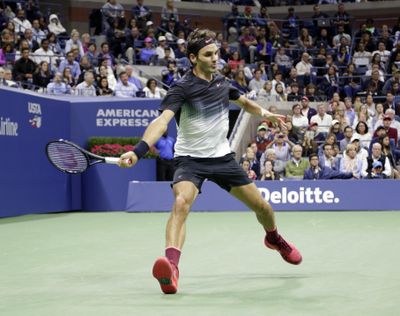Roger Federer looks back at best in straight-sets win at US Open

NEW YORK – This was Roger Federer at his hard-to-beat best, so unlike the pair of uncomfortable five-setters he labored through to begin the U.S. Open.
Federer’s back looked just fine, his movement precise, his strokes absolutely on-point. It all added up to a straightforward 6-3, 6-3, 7-5 victory over 31st-seeded Feliciano Lopez in the third round at Flushing Meadows that lasted all of 106 minutes under the roof in Arthur Ashe Stadium on a rainy Saturday night.
“I think,” Lopez said, “he’s OK.”
The most telling statistic was that the No. 3-seeded Federer was guilty of 16 unforced errors, which is not merely a remarkably low total on its own merits but also significant when viewed through the prism provided by his matches earlier in the week. He averaged 62 errors in each of those outings, against 19-year-old American Frances Tiafoe and 35-year-old Russian Mikhail Youzhny.
That was the first time in the 36-year-old Federer’s career that he opened a Grand Slam tournament with two consecutive matches that lasted five sets.
More relevant numbers: Federer was broken eight times total in those matches, but only once against Lopez.
“I’m really pleased with the performance,” Federer declared. “It’s exactly, I guess, maybe what I needed going into the next round.”
Federer improved to 13-0 against Lopez and 33-1 in night matches at Flushing Meadows, so perhaps the lopsided nature of this shouldn’t be all that surprising. Still, Federer had acknowledged after edging a cramping Youzhny that a lack of proper practice leading up to the U.S. Open on account of tweaking his back in August meant that his timing was off.
“I needed to get over the fear of the back issue, especially in that first match, the first set. Then I think the wobble I had in the second round was due to my preparation. I think now I’m just trusting my movement better. My serve is there. My mind is there. I can finally focus on playing tennis and not so much about the past,” Federer said. “So it’s nice to be in the present in my mind, looking ahead, thinking tactics.”
In other words: Consider Federer back on track.
“The fact that he won two long matches, best-of-five, fighting, struggling a little bit more than normal in the early rounds – I think it was good preparation for him coming into this third round,” Lopez said. “He seems to be fit and fast and serving well.”
Next for Federer is a match against 33rd-seeded Philipp Kohlschreiber, who beat John Millman 7-5, 6-2, 6-4. Federer’s head-to-head record against Kohlschreiber is 11-0.
Looming further down the road is a possible semifinal matchup against No. 1 Rafael Nadal, Federer’s long-time rival. They have never met at the U.S. Open.
Nadal won earlier Saturday, although for the second match in a row, he needed to shake off a poor opening set that he dropped. Nadal advanced, though, once again figuring things out in the second set and strolling the rest of the way to defeat Leonardo Mayer of Argentina 6-7 (3), 6-3, 6-1, 6-4 and get to the fourth round.
The aspect that caused Nadal the most consternation was his difficulty converting break points, going 6 for 25.
“I overcame a tough situation today. That’s very positive for me. I am very happy about this,” Nadal said. “I know I cannot play very well always, and not the whole match.”
Now Nadal meets 64th-ranked Alexandr Dolgopolov, a 28-year-old from Ukraine who is being asked questions about a different tournament entirely – one where he was involved in a match under scrutiny from anti-corruption investigators because of unusual betting.
Dolgopolov reached the fourth round at Flushing Meadows for the first time since 2011 with a 6-1, 6-0, 6-4 win against Viktor Troicki, then said he has been interviewed by the Tennis Integrity Unit.
That group is looking into a match he played against Thiago Monteiro at a hard-court event in Winston-Salem, North Carolina, on Aug. 20.
Also still in the top half of the men’s bracket are No. 6 Dominic Thiem, No. 9 David Goffin and No. 24 Juan Martin del Potro, the 2009 U.S. Open champion. No one on the other side has ever been to a Grand Slam final, let alone one such a title.
The woman who is currently trying to hold onto her No. 1 ranking has never won a major trophy, either, but she is still in the running for one – just barely. Karolina Pliskova saved a match point in the second set and came all the way back to get past No. 27 Zhang Shuai of China 3-6, 7-5, 6-4 and get to the fourth round.
“I don’t feel like I’m playing that good again,” said Pliskova, last year’s runner-up in New York, “but I’m still in the draw, actually, so I’m not going to be that sad.”
No. 4 seed Elina Svitolina has a chance to overtake Pliskova in the rankings and stayed in the draw with a 6-4, 7-5 victory over Shelby Rogers of the U.S. Another American advanced when 20th-seeded CoCo Vandeweghe outlasted 2012 Wimbledon finalist Agnieszka Radwanska 7-5, 4-6, 6-4.
No. 15 seed Madison Keys gave the host country a total of five women in the round of 16 when she came back to beat No. 17 Elena Vesnina of Russia 2-6, 6-4, 6-1 in a match that began shortly before midnight and ended at 1:45 a.m.
That’s the second-latest finish for a U.S. Open women’s singles match. The record of 1:48 a.m. was set by a match won by Keys a year ago.
“I’m going to immediately get in bed,” Keys told the sparse crowd left in Ashe by the end, “and sleep until like 3 o’clock tomorrow.”